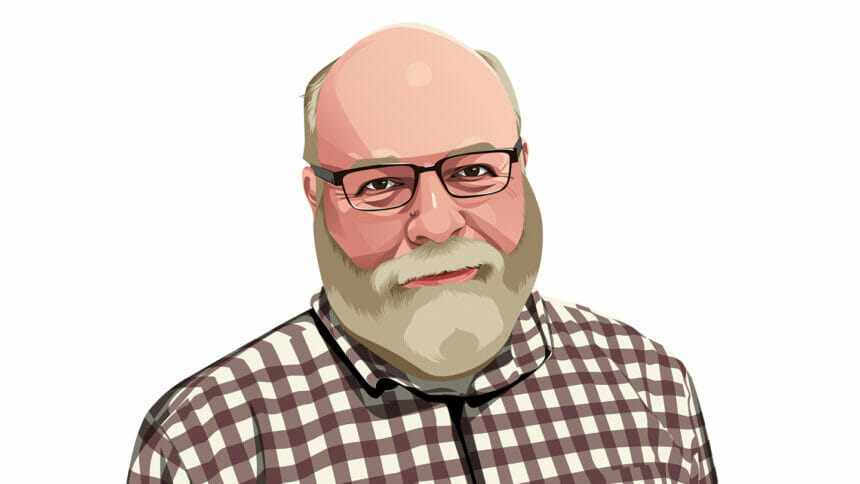
No, I wasn’t having a parasitic brainworm removed, though long-term care coworkers and friends frequently express strong suspicions that one might be present. But I was in the hospital last week, lying flat on my back in a stylish cap and gown, held in place by a tangle of electrodes and IV tubing, terror-struck and mentally doomsday prepping for worst-case scenarios.
So why was I there? It’s not that I don’t want to tell you. After all, you seem like nice people whom I could completely trust with my deepest, darkest secrets. The problem is that I’d rather not utter such an unpleasant, image-evoking word in a family publication.
Fortunately there’s a grammatical symbol that sounds exactly the same, so from now on, the experience I endured will be discretely represented as a :oscopy. No further explanation required.

Anyway, it was a routine diagnostic procedure, certainly nothing to be catastrophized. But as I grew weak from 24 hours of compulsory starvation and other preparatory unpleasantness, the anxiety of imminent sedation slowly consumed my thoughts like an insidious brainworm.
In advance of my imagined demise, I called long-lost friends to hear their voices one last time, distributed emergency contact info, reminded a confidante to destroy my rant-and-rave-filled journals and even pondered musical options for my memorial service. (The seventh movement of Robert Schumann’s “Kinderszenen,” please.)
A friend drove me to my doom, where I was soon stripped of my clothes, interrogated, phlebotomized and left to cope with my panic-stricken thoughts for another hour or so. An unflattering selfie, perhaps unwisely shared in this public space, reveals a broken man, frightened, humiliated and resigned to his fate. (Related question: How little hair does one have to have before they don’t make you wear that stupid hat?)
Finally, a nurse drew back the curtain with a dramatic flourish and the wheels on my bed began to move. The ceiling tiles flashed by, along with a hyper-speed jumble of faces and memories, until the double doors crashed open and I rolled into the procedure room like a brainworm entering the hippocampus.
Thankfully, after being met by three gowned professionals and seeing an overwhelming array of surgical equipment, my dread was displaced by an entirely different, but even more alarming realization: “This is going to be very, very expensive.”
Regaining consciousness back in my curtained cell a mere 30 minutes later, I was relieved to have cheated death, but angry to be awakened from my first good sleep in years. Then, after consuming bushels of Saltine crackers with the ferocity of a member of the Donner Party, I was driven back home.
So why am I telling you all this? Well, for one thing, we’re friends — isn’t that reason enough?
But also because, as someone who thinks about long-term care for most waking hours of every work day, my :oscopy turned out to be a rather profound experience, a forced enhancement of my perspective and empathy.
It reminded me what it’s like to feel absolutely helpless, like many of our residents do. What it’s like to lose my dignity. What it’s like to have to trust absolute strangers and bewildering health care systems. What it’s like to think back on your life, with all its joys and regrets, and wonder if it’s almost over.
Or maybe most disturbingly, what it’s like to feel completely alone.
As a long-term care staff member, faced every day with folks navigating far greater challenges than my insignificant :oscopy, it’s impossible to quantify what a gift you are to those you serve. Especially the way you soothe fears, from the irrational like mine to the deeply justified, and serve as devoted companion on a journey no one wants to take.
Someday, not “if” but “when,” I’ll face my mortality again, and for real. And when that happens, and I’m in your care, I’ll be inexpressibly grateful for the gift of your prodigious skill, open heart and boundless compassion.
Whatever happens, I know you’ll be there for me, because that’s what you do for everybody, every day. It will be just the three of us. You, me and my brainworm.
Things I Think is written by Gary Tetz, a two-time national Silver Medalist and three-time regional Gold and Silver Medal winner in the Association of Business Press Editors (ASBPE) awards program, as well as an Award of Excellence honoree in the APEX Awards. He’s been amusing, inspiring, informing and sometimes befuddling long-term care readers since the end of a previous century. He is a writer and video producer for Consonus Healthcare in Portland, OR.
The opinions expressed in McKnight’s Long-Term Care News guest submissions are the author’s and are not necessarily those of McKnight’s Long-Term Care News or its editors.
Have a column idea? See our submission guidelines here.





